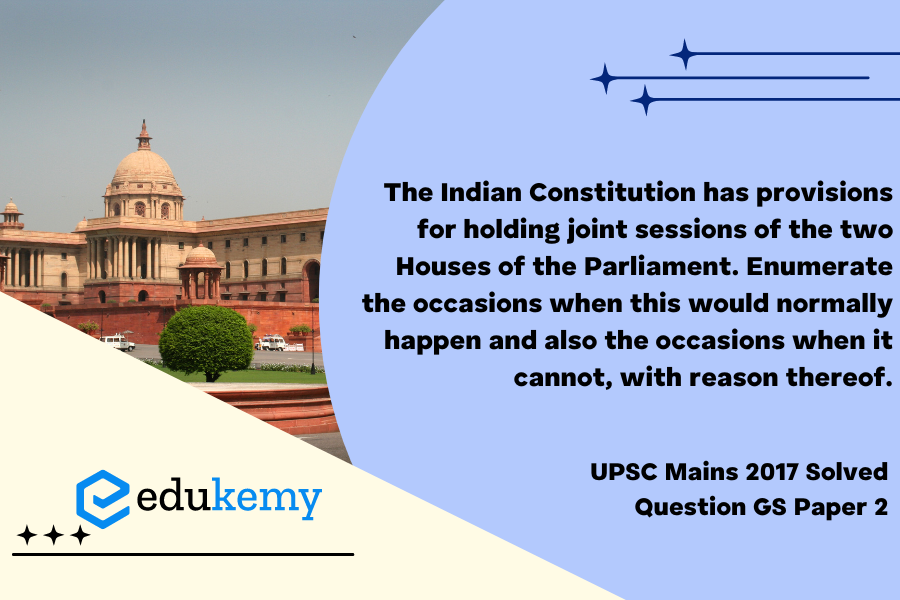The Indian Constitution, a comprehensive document embodying the fundamental principles and guidelines for governance, incorporates provisions for the joint sessions of the two Houses of Parliament, namely the Lok Sabha and the Rajya Sabha. This constitutional mechanism is invoked under specific circumstances, reflecting the framers’ foresight in ensuring effective legislative functioning. Joint sessions become imperative when a legislative deadlock arises, typically due to disagreements between the two Houses on crucial bills. During such impasses, the President of India, acting on the advice of the Cabinet, can summon a joint session to break the stalemate and facilitate the passage of essential legislation. This collaborative approach underscores the commitment to democratic governance and the resolution of legislative gridlocks for the greater public good.
Tag: Indian Constitution.
Contents
Decoding the Question:
- In Introduction, try to write about the joint session and its Constitutional Provisions.
- In Body,
- Discuss various sessions when it normally happens and occasions when it cannot.
- Also mention reasons for these occurrences.
- In Conclusion, write the overall significance of Joint Sitting.
Answer:
The Parliament of India is bicameral and concurrence of both houses is required to pass any bill. However, sometimes there are situations of deadlock between the upper house i.e. Rajya Sabha and the lower house i.e. Lok Sabha. To remove such deadlock, Article 108 of the Indian Constitution provides for Joint Sitting. It is called by the President and presided over by the Speaker. .
Occasions when it Normally Occurs:
- Article 87 provides two special occasions on which the President addresses a Joint Sitting. The first is to address the opening session of a new legislature after a general election. The second is to address the first sitting of the Parliament each year.
- Address of the foreign dignitaries to the Parliament. For example: President Barack Obama addressed the Parliament in 2010.
- It is also summoned for deliberating on the bill in the following situations:
- A Bill passed by one House and it is rejected by the other House.
- Both Houses have finally disagreed on the amendments to be made in the Bill.
- More than six months are elapsing from the date of the reception of the Bill by the other House without the Bill being passed.

Exception to joint sittings: Not all bills can be referred to a joint session of Parliament. There are two exceptions:
- Money Bill: Under the Constitution of India, money bills require approval of the Lok Sabha only. Rajya Sabha can give suggestions to Lok Sabha, which it is not required to accept. Even if the Rajya Sabha doesn’t pass a money bill within 14 days, it is deemed to have been passed by both Houses of Parliament after expiry of the above period. Therefore there is no need to summon a joint session in the case of money bills.
- Constitution Amendment Bill: As per Article 368, the Indian Constitution can be amended by both houses of parliament by 2/3rd majority. In case of disagreement between both houses, there is no provision to summon a joint session of parliament.
The provision regarding the joint sitting since 1950 has been invoked only thrice. The bills that have been passed at joint sittings are the following:
- Dowry Prohibition Bill, 1960.
- Banking Service Commission (Repeal) Bill, 1977.
- Prevention of Terrorism Bill, 2002.
Joint Sitting is an extraordinary machinery provided by the Constitution to resolve a deadlock and ensure synergy between both the Houses of the Parliament. It also establishes checks and balances by Rajya Sabha to hasty legislation of the government.
In case you still have your doubts, contact us on 9811333901.
For UPSC Prelims Resources, Click here
For Daily Updates and Study Material:
Join our Telegram Channel – Edukemy for IAS
- 1. Learn through Videos – here
- 2. Be Exam Ready by Practicing Daily MCQs – here
- 3. Daily Newsletter – Get all your Current Affairs Covered – here
- 4. Mains Answer Writing Practice – here


